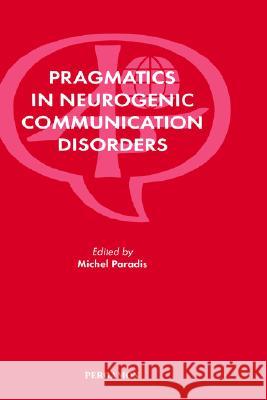Książki: » Psychologia » Pragmatics in Neurogenic Communication Disorders

Pragmatics in Neurogenic Communication Disorders
ISBN-13: 9780080430652 / Angielski / Twarda / 1998 / 270 str.
Two viewpoints on pragmatics are of interest to the clinician and researcher: The various types of deficits of pragmatic competence in different neurogenic communication disorders on the one hand, and the use of pragmatic features as a compensatory strategy to supplement impaired linguistic competence on the other. Both are investigated in this volume. For the purpose of the book, "pragmatics" is understood to include not only discourse organization but also any inference from discourse, situational context, general knowledge, affective prosody and any paralinguistic phenomena used to derive an interpretation for any utterance. It therefore includes the use of metaphors, indirect speech acts, jokes, sarcasm, and any nonliteral interpretation.The reader will thus find information on pragmatic deficits subsequent to right hemisphere damage, pragmatic disorders in dementias, deficits in discourse organization in right and left hemisphere damaged patients, as well as on the use of pragmatic features by fluent and nonfluent aphasic patients. These studies represent original research by members of the IALP Aphasia Committee and their colleagues carried out over the past two years specifically for this publication. This is the third in a series of books commissioned by the International Association for Logopedics and Phoniatrics and published by Pergamon. It carries over twenty commissioned chapters on original work by leading researchers and investigates both how communication disorders affect pragmatic competence, and how pragmatic features can be used to compensate for impaired linguistic competence.










